How to make a puppy gain weight fast? Ensuring your newborn puppy is healthy is essential when looking forward to a lifetime of happiness together. However, some puppies often struggle with weight and need help to gain it.
Proper weight gain is required, especially during a puppy’s delicate growth and development phase. This article discusses several helpful ideas for growing an excellent and healthy pet dog.
Why Puppies Might Need to Gain Weight
Sometimes, there are cases when a puppy appears to be underweight. Some of the reasons include:
- Behavior Issues: Even when very nutritious food is available, some pups will only eat once they feel hungry.
- Stress: A new home and new family can be quite stressful to any puppy, causing reduced body weight.
- Diet: People, too, don’t like all the food they have five answers back. Some that find their way to your puppy may contain all calories and no nutrients.
- Sickness: Puppies with a health condition like worms snatch away their hunger, and they practically don’t want to eat, which again leads to weight loss.
- Energy: Active puppies who engage in all games will mostly burn more calories than the ones they consume.
Determining the cause of an underweight puppy is necessary before making any changes.
If your puppy has health issues, take him to a veterinarian immediately to check for serious health reasons.
How to Make a Puppy Gain Weight Fast: Expert Tips
The goal in the case of an underweight puppy is to obtain a remedy through minute healthful and related changes.
Here, we take a deeper look at the effective ways of causing weight gain in a puppy in a safe manner.
These practices are beneficial in enhancing how and even when a younger dog grows.
1. Choose High-Calorie Puppy Food
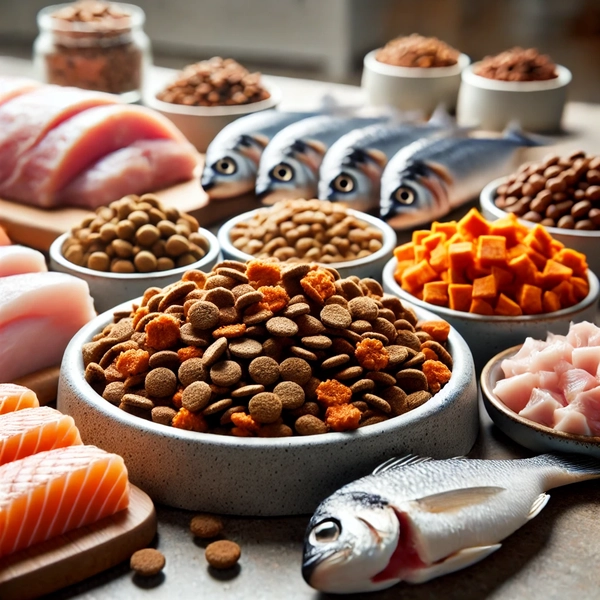
When solving the problem of underweight puppies, the easiest option would be to pick a high-calorie puppy-curated meal.
These types of foods have more calories and nutrients thanks to the design used in making them. Here are ways in which this could be managed:
Pick Healthy Food Options: It is always good to feed a puppy any food as long as it has proteins. Some good sources of proteins are chicken, beef, and fish.
Check the Fat: Healthy fats, such as chicken fat and salmon oil, are an excellent method of adding calories to a puppy. Fat is stored in the body’s components to be used as tissues in its rebuilding.
Feed Them Carbohydrates: It is excellent to feed puppies food that contains soft or easy-to-breakdown carbohydrates, such as brown rice and sweet potatoes.
These kinds of carbs break down over a longer period than fast carbs, such as sugar, and provide puppies with continuous energy.
To assist you in selecting, here’s a simple comparison table for selecting high-calorie puppy food:
| Brand Name | Protein Source | Fat Content (%) | Carbohydrate Source | Calories per Cup |
| Brand A | Chicken & Fish | 18% | Sweet Potatoes | 400 kcal |
| Brand B | Beef | 20% | Brown Rice | 420 kcal |
| Brand C | Chicken & Lamb | 16% | Peas and Carrots | 390 kcal |
Tip: Avoid foods that have unnecessary ingredients like corn or soy. These will not help you put weight on your puppy since they are not more nutritional and may only make it harder.
2. Feed Small Meals More Often
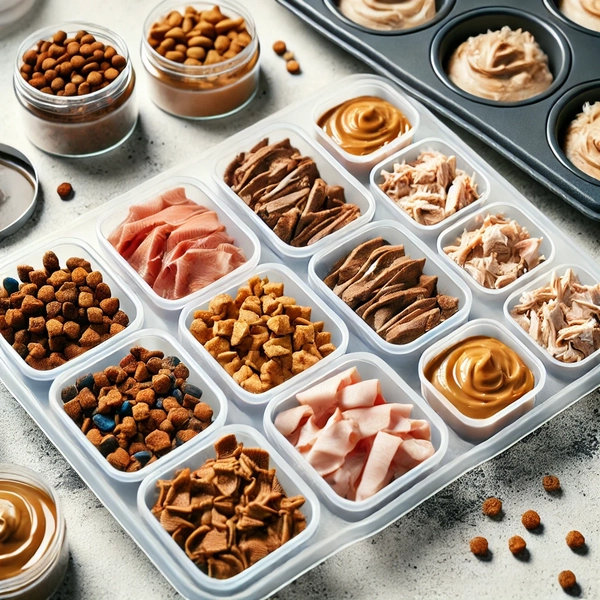
The stomach capacity in puppies is relatively tiny. Feeding the puppies (meals) using those bowls more frequently is better.
If you have too much food for your puppy, feed them a little at a time for some time (those lidded meals packing boxes for small kids at school). This will ensure your puppy does not eat too fast and suffer from the food.
Frequency: As explained earlier, instead of feeding your puppy two big meals a day, it would be better if the total for the day was reduced and the amounts used to provide food three or even four times.
Consistency: You must always ensure that your puppy eats in a specific pattern. Working out a rigid non-eating plus excessive eating pattern helps them control their food, making fat storage much more manageable.
Example Feeding Schedule:
| Time of Day | Meal Type | Portion Size |
| Morning (7 AM) | High-calorie puppy food | Small portion |
| Mid-Morning (11 AM) | Small treat or snack | Small portion |
| Afternoon (2 PM) | High-calorie puppy food | Small portion |
| Evening (6 PM) | High-calorie puppy food | Small portion |
Note: Adjust the portion sizes based on your puppy’s breed and weight to ensure they get enough calories.
3. Add High-Calorie Treats

Boosting the caloric content with some high-calorie treats is a creative way to help a growing puppy get more food.
It looks simple but be warned that treats must be taken in moderation and should make up only 10% of the daily intake.
Such high-calorie snacks are safe for consumption. Here are a few examples of some healthy snacks:
- Peanut Butter: Some xylitol-free peanut butter can help add a tasteful and calorie-dense factor to their food.
- Cooked Chicken: Pieces of gently cooked, plain chicken with no flavoring can be mixed into their meals to make the muscles more effective and toned.
- Cheese Cubes: Puppies enjoy cheese thoroughly, provided it is fat and calories—there is a debate on whether it should be fat or pleasure. These can be given as small pieces, such as training aids or snacks.
Remember that these are only a few samples on the list, so try to avoid repetition and ensure that those pros include safety aspects for young canines.
4. Provide Wet Food or Make Some At Home
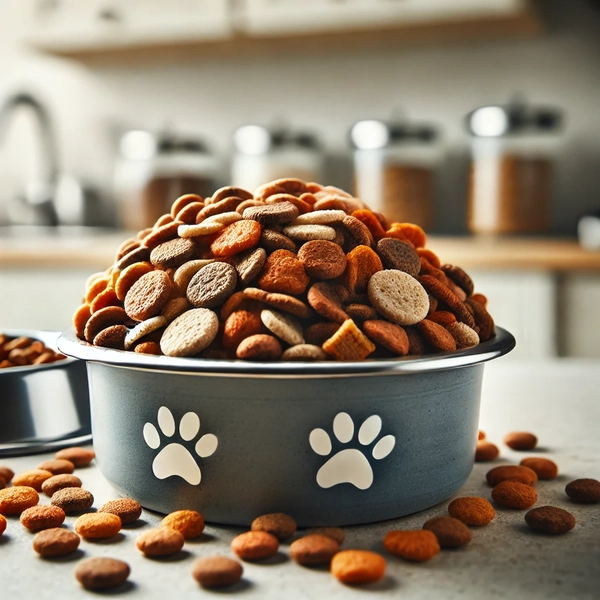
Additional nutrition in the form of a mixture of wet dog food with dry kibble or some homemade ingredients can help make food more palatable, caloric, and enjoyable to eat; this way, dogs, especially puppies, will be significantly more obliged to eat it.
- Dry Food Mixture: Add a small portion of wet meal to dry kibble food to increase its liquid content and kCal intake.
- To Bake: Boil or grill the muslin-wrapped chicken and add the dog eggs and coconut in the desired proportions for serving. These foodstuffs will not only be delicious but also packed with nutrients.
Always observe caution and give the puppy dietary increment allowances at a time to prevent stomach upsets.
5. Try to Fatten Up a Puppy with Supplementary Feeds
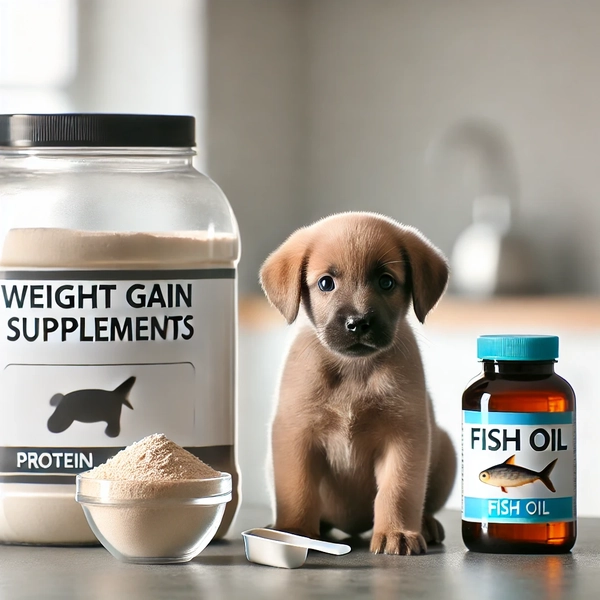
Speaking of more calories for puppies, these are fatty deposits and the usual food it depends on. Here’s what to consider:
- Protein Powders: Supplements that aid in muscle growth; these are the proteins used in their meals.
- Healthy Fats: In addition to food, adding fish oils or coconut oils to meals also provides extra fats and calories.
- Fat Intake Help: Other weight-gaining products are also available to mix with food. These contain essential nutrients, vitamins, and calories.
Always seek your veterinary advice before using any new supplement on your puppy to verify her safety.
6. Monitor and Adjust Their Diet as Needed
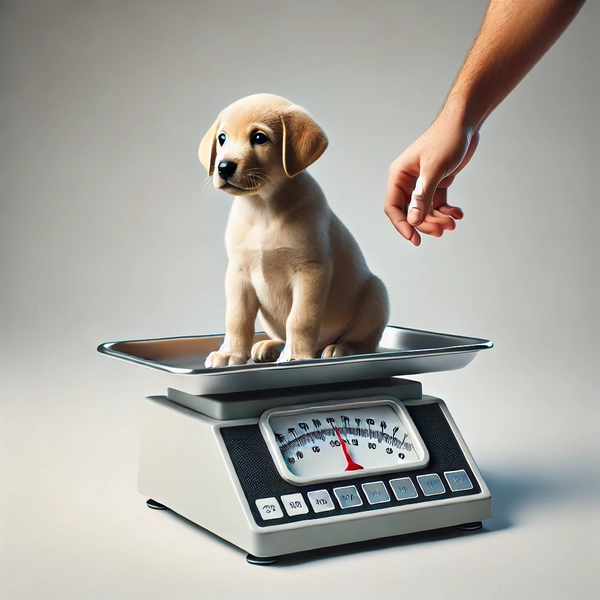
We need to determine how to do that while managing them by calling the necessary therapy to assist with this.
- Weekly Weigh-ins: In this context, it is imperative to weigh your puppy once a week to determine whether it is making progress in terms of weight. In case it falls short, slightly raise the ratio.
- Appetite and Energy Check: A good appetite combined with activeness would imply that the puppy is okay. However, if it is not interested in food or is merely tired, it may be time to look at other alternatives or involve a vet.
Table for Tracking Progress:
| Week | Weight (lbs) | Appetite Rating (1-5) | Energy Level (1-5) |
| Week 1 | 5 lbs | 3 | 4 |
| Week 2 | 5.5 lbs | 4 | 4 |
| Week 3 | 6 lbs | 5 | 5 |
| Week 4 | 6.5 lbs | 5 | 5 |
7. Exercise to Build Muscle, Not Burn Calories
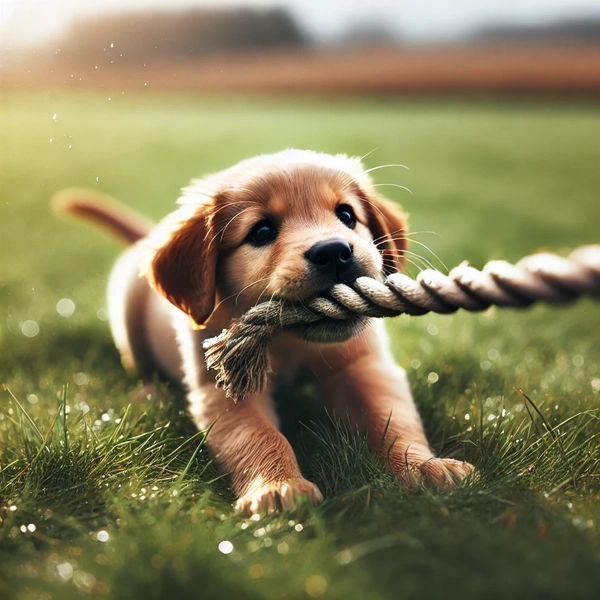
This calls for activities that will boost the animals’ energy metabolism to a great girth without depleting it.
- The gentle game of tug-of-war: This game extensively worked, and the muscles of the neck and shoulders of the dog improved.
- Short Training Session: We all subject our puppies to a mental workout. The training also increases their appeal, tooth stimulation, and hunger. Use a high treat fee during the session, which acts as a calorie addition.
- Consume controlled walks: Keep the walks short, as this will help promote appetite while not tiring the puppies. In the case of young puppies, limit it to around 10- 15 minutes.
Note: Be cautious when walking puppies. Do not let them go crazy, as most of them are yet to grow, and they need all the energy available to grow and develop.
8. Ensure a Comfortable Feeding Environment
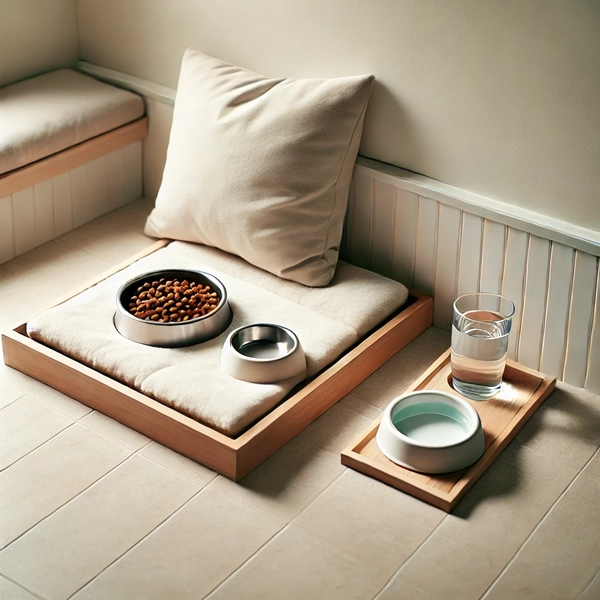
The following can help the puppy to eat:
- Create a Calm Space: Find a familiar, peaceful place where feeding can occur. Avoid feeding in areas with a lot of people or noise.
- Use of Proper Feeding Tools: Some puppies prefer raised dishes to eat more nicely. Others may prefer a typical dish on the floor. Experiment to see what your puppy likes the most.
- Give Fresh Drinking Water: There must always be fresh and clean water near your dog or puppy. The body stays healthy because digestion always occurs in a reasonably wet environment.
When to See a Veterinarian
If you have a small puppy that has stopped growing or seems to be losing pounds, it is essential to have the puppy’s veterinarian look at it. They would be able to examine for:
- Parasites: Worms can cause the rapid loss of weight in puppies.
- Infection: Puppies like yours who suffer from fever or display other signs of sickness might also have an infection.
- Infections: It is possible that some puppies may not have lost weight and still have faced malnourishment as a result of persistent infections.
Among the vet’s responsibilities is to advise the sick dog owner on drugs, food, or supplements, including the kind of food and at what intervals each food should be given to the dog to raise its weight to that of an average dog.
Last Tricks in Making Puppies Gain Weight
These are the concise points that need to be repeated:
- Regularity is the fundamental instruction: Observe particular times when feeding your puppy to help them become accustomed to eating at certain times.
- Puppies must also be hydrated: Make sure your pup always has drinking water available.
- The nutritional value, not the amount: Try to buy the best puppy food you can afford, as it goes a long way.
Helping eliminate upper weight is impossible in a day or two since it requires time, support, and care. After understanding how these eating habits must be changed, you can also be sure your pet will grow healthy and happy. Remember that not all puppies respond similarly; each has a unique solution!
Are you ready to ask for assistance from a professional regarding a puppy’s Weight problem? Do not wait for any questions. Veterinarians are simply your best friends, especially for puppies.
By following these guidelines, you can raise an aspiring healthy puppy. It will not be void if, in due time, you help and give attention to your companion to reach its healthy and desired weight. All you have to do is carry on with proper care and the necessary make and see your puppy develop accordingly!
Don’t forget: Patience and Consistent Behavior will Lead You to the Right Path!